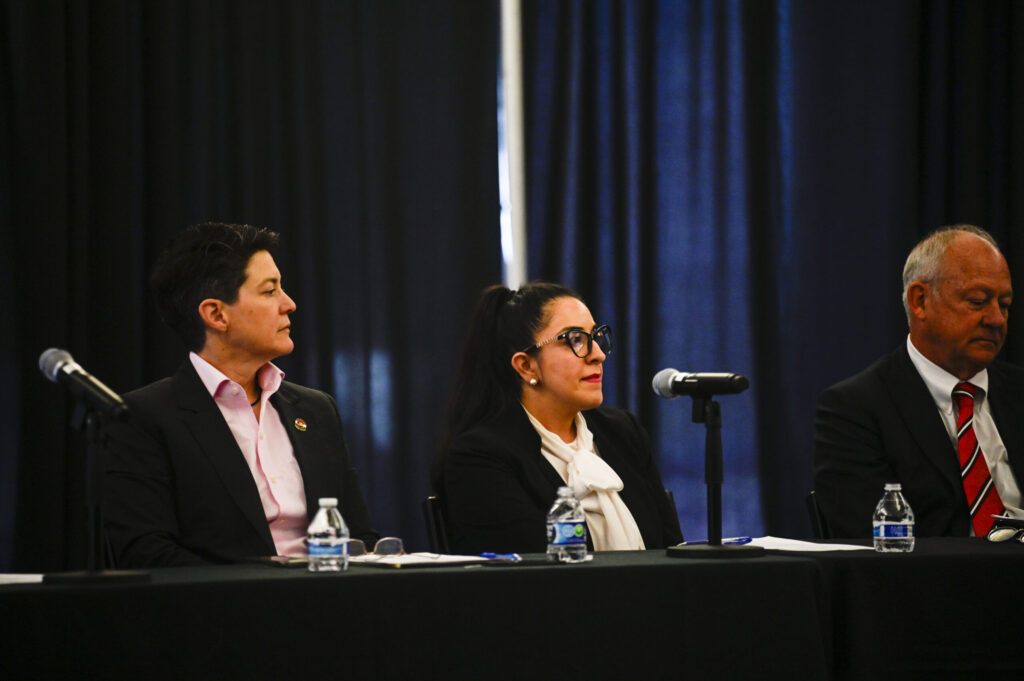Federal judge ‘reluctantly’ dismisses claim by Club Q survivors against property owners
A federal judge agreed last week that a recent change to Colorado law barred him from allowing the survivors of an LGBTQ nightclub shooting to hold the property owners liable for safety deficiencies that allegedly contributed to the massacre.
At the same time, U.S. District Court Senior Judge William J. Martínez slammed the legislature’s 2022 amendment as effectively excusing landowners from liability in mass shootings.
“The Court shares Plaintiffs’ concerns and bristles at the idea that utterly foreseeable mass shootings can continue to occur with little to no civil recourse for victims. By closing the courthouse doors to mass shooting victims,” he wrote, “the General Assembly has essentially given landowners carte blanche to implement zero safety precautions against obvious — or even known — threats of violence by deranged individuals.”
In November 2022, Anderson Aldrich murdered five people and injured more than two dozen others at Club Q in Colorado Springs. As a result, Aldrich is serving multiple life sentences in prison.
Several plaintiffs — including surviving representatives of the deceased and those who suffered injuries — sued the county, the elected sheriff and those responsible for Club Q. Against the club’s owners and operators, the plaintiffs raised a claim under the Colorado Premises Liability Act.
The law renders property owners liable for injuries to various categories of people based on their status. In the case of the injured or deceased Club Q patrons, the plaintiffs would need to prove the owners failed to exercise reasonable care to protect them from dangers the club knew or should have known about.
The plaintiffs argued they had put forward sufficient allegations, including:
• The defendants reduced staffing from five security employees to one
• They did not implement active shooter protocols
• They had, but did not use, metal detectors
• They ignored specific threats prior to the massacre
• The facility lacked adequate exits
Siding with the defendants would “create blanket immunity for property owners whenever a mass shooting occurs — no matter how foreseeable the threat, how glaring the security lapses, or how directly those failures contributed to the harm. That is not the law,” argued the plaintiffs’ attorneys.
But that is the law, countered the defendants, due to a change the legislature made near-unanimously several months before the shooting.
The Colorado Supreme Court, in 2020, delivered a 4-3 decision about whether survivors of a 2015 mass shooting at a Colorado Springs Planned Parenthood clinic could sue. Like the Club Q victims, the plaintiffs in Rocky Mountain Planned Parenthood, Inc. v. Wagner sought to hold Planned Parenthood liable under the Premises Liability Act for security deficiencies that allegedly contributed to their injuries.
The majority concluded the case could proceed, reasoning a jury could find the shooter’s actions were “not the predominant cause of the plaintiffs’ injuries” and that Planned Parenthood’s alleged conduct was “a substantial factor.”
Justice Melissa Hart, writing in dissent, argued that conclusion “ignores the reality that the overwhelming — the predominant — cause of harm to victims of mass shootings is the maniacal determination of the shooter himself.”
In response, the legislature amended the Premises Liability Act in 2022 to align with Hart’s interpretation. The law now directs judges to consider whether a third party’s criminal acts were the “predominate cause” of the injuries — and not the landowner’s actions.
Martínez, in evaluating the Club Q property owners’ motion to dismiss, agreed the law change doomed the plaintiffs’ claim.
“Applying Wagner and the amended portions,” he wrote in a June 26 order, “the Court feels constrained to conclude as a matter of law that Aldrich’s conduct was the predominant cause.”
Martínez noted that the parties disagreed whether he should be the one to decide the magnitude of Aldrich’s role as a legal matter, or if a jury needed to weigh the facts. Martínez “reluctantly” concluded that, based upon other lawsuits arising from mass murders in Colorado, he had to rule that a shooter’s actions were the cause.
In doing so, Martínez agreed the General Assembly’s 2022 amendment meant similar lawsuits against property owners would almost never succeed. However, he noted lawmakers were apparently persuaded by Hart’s dissent, which argued it would be disastrous to impose mass shooting liability on businesses that are targets of violence because of the clientele they serve.
“Rather, the Court must respect the General Assembly’s policy judgment — notwithstanding how strongly it disagrees with it — to ‘promote private property rights,’ ‘foster the availability and affordability of insurance,’ and ‘protect landowners from liability,’ even if at the expense of Plaintiffs’ civil recovery in this most tragic case,” wrote Martínez.
At the same time, he permitted the plaintiffs’ wrongful death and negligence claims to proceed against the property owners, reasoning it would require a “fact-intensive inquiry” to determine whether those allegations are ultimately not viable.
A motion to dismiss from El Paso County and the sheriff is pending before Martínez.
The case is Vance et al. v. El Paso County Board of County Commissioners et al.
Colorado Politics Must-Reads:














